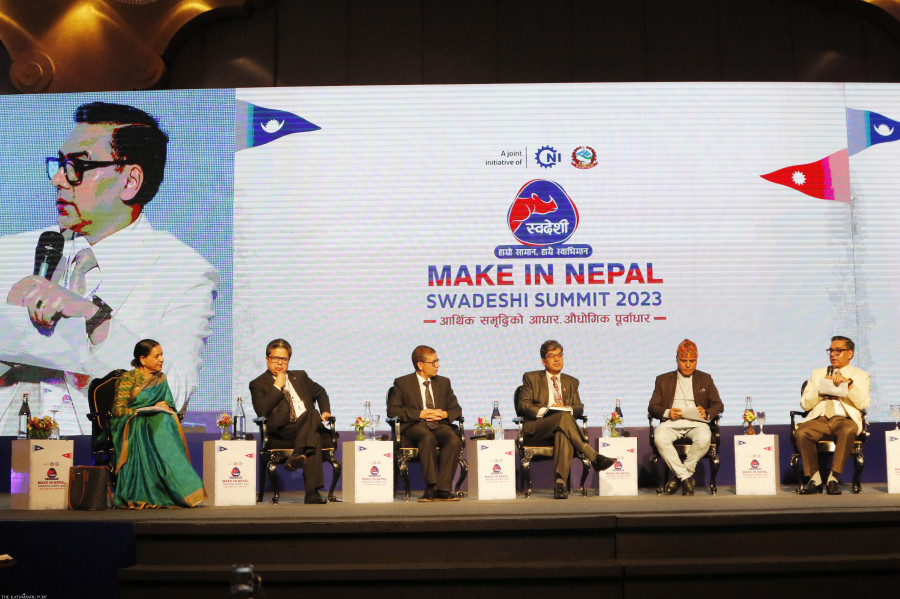Money
Industrialists lament unfavourable business environment
The Make in Nepal initiative, jointly started by the government and the private sector, had envisioned four targets to boost the job market and the economy, but they all failed.
Pawan Pandey
Industrialists lamented the absence of an enabling environment that could aid the establishment of industries in the country.
Speaking at the Make in Nepal summit, jointly organised by the Confederation of Nepalese Industries (CNI) and the Ministry of Industry, Commerce and Supplies, they said favourable policies by the government would enable the business sector to grow and expand and create job opportunities which would stop the brain drain.
Vishnu Kumar Agarwal, president of the CNI, said domestic production is the only alternative through which the industry would thrive and substitute the ballooning imports.
“Import ban is not the solution,” said Agarwal.
The industry participants said the inconsistent policy of the government has hindered the development of the industrial ecosystem in Nepal.
Hari Bhakta Sharma, former president of the CNI, said four targets were set at the start of the Make in Nepal initiative.
They were: To establish 1,000 industries in Nepal in a year, narrow down the trade deficit, create 150,000 new jobs in a year and increase the contribution of the industrial sector to the country’s gross domestic product.
“None of these targets have been achieved,” said Sharma, speaking at the session, titled “Building Better Industrial Ecosystem.”
He said that new job creation in the country is extremely low. The industrial sector's contribution to GDP has remained below 6 percent.
Industrialists say it is natural for the manufacturing sector to see a decline since the country witnessed insurgency and political instability as well as power crisis in the last decade.
But even after the country saw a stable government for nearly three and a half years, there was no notable development in the manufacturing sector.
Now, amid political instability, the private sector is complaining of a sales slowdown, an inventory pileup, and difficulties in loan repayment.
“It is time for us to analyse where and why we missed attracting investments in the industrial sector,” said Sharma.
The speakers and participants complained that the government had failed to take ownership of the Make in Nepal campaign.
As matters stand, Nepal is today the weakest country in South Asia in terms of industrial production.
“This is because Nepal’s industrial laws are outdated,” said Sharma. “There are many sectors that need to be deregulated at the earliest.”
In the past, Nepal used to export goods and was much less dependent on imports.
“We, now, have been promoting the policy of exporting labour. We are now totally dependent on remittances. We need to change it,” said Sharma.
Min Bahadur Shrestha, vice chairman of the National Planning Commission, which frames the country’s policies, said the government is not trying to disrupt the production ecosystem by bringing regressive policies.
“After the privatisation policy, the private sector failed to establish new industries. This caused the manufacturing sector’s share in the economy to slump,” said Shrestha.
“Lack of skilled manpower and expensive electricity and transportation costs further affected the operation of industries,” he added.
That adversely resulted in entrepreneurs moving to more profitable sectors such as trading and the manufacturing sector suffered.
The contribution of the manufacturing sector to the country’s GDP is a mere 5.3 percent.
Shrestha said that the government’s policy has always accorded priority to the promotion of the industries.
The provision for banks and financial institutions to extend 45 percent of their credit to the productive sectors has been made to promote industries, he said. “But, the investment in unproductive sectors such as real estate has put the country’s economy into disarray.”
The speakers said that the prospects of getting foreign investments in the industrial sector will increase following Nepal’s graduation from the least developed country (LDC) status.
Nepal is set to graduate from the United Nations’ LDCs status by 2026.
“The development of the agricultural sector should have led to industrial development and the progress in these two sectors should have driven the services sector, but that has not been the case with Nepal,” said Shrestha.
Neeru Rayamajhi, president of the Federation of Women Entrepreneurs’ Association of Nepal, said the industrial ecosystem in Nepal is not women-friendly.
“There are difficulties in upscaling the women-led micro, small and medium enterprises,” said Rayamajhi.
Lawmaker Swarnim Wagle said the industrial policy must give encouragement and space to the production of goods having a competitive advantage.
“The subsidies to certain sectors must be given but there should be a time limit,” said Wagle.
Policy and structural transformation are required for a sustainable economic development of Nepal, he added.
“The practice of entrepreneurs visiting political leaders to gain policy privileges and other facilities is prevalent. That needs to end,” said Wagle.
“Our demographic projection shows that we will enter into being an ageing society by 2028 and into an aged society by 2050. We have a limited time frame to bring a shift in our economy,” Wagle added.




 13.12°C Kathmandu
13.12°C Kathmandu














